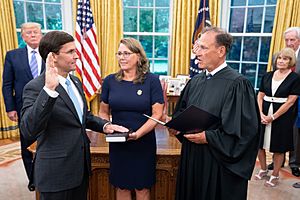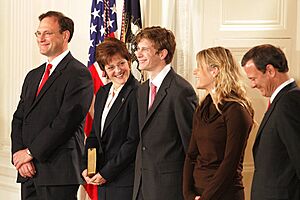Samuel Alito facts for kids
Quick facts for kids
Samuel Alito
|
|
|---|---|
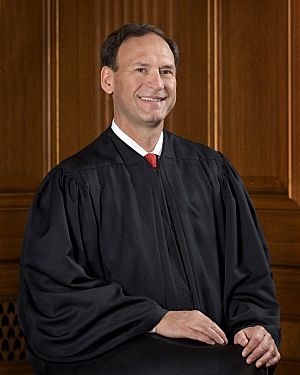
Official portrait, 2007
|
|
| Associate Justice of the Supreme Court of the United States | |
| Assumed office January 31, 2006 |
|
| Nominated by | George W. Bush |
| Preceded by | Sandra Day O'Connor |
| Judge of the United States Court of Appeals for the Third Circuit | |
| In office April 30, 1990 – January 31, 2006 |
|
| Nominated by | George H. W. Bush |
| Preceded by | John Joseph Gibbons |
| Succeeded by | Joseph A. Greenaway Jr. |
| United States Attorney for the District of New Jersey | |
| In office December 10, 1987 – April 30, 1990 |
|
| President | Ronald Reagan George H. W. Bush |
| Preceded by | Thomas Greelish |
| Succeeded by | Michael Chertoff |
| Personal details | |
| Born |
Samuel Anthony Alito Jr.
April 1, 1950 Trenton, New Jersey, U.S. |
| Spouse |
Martha-Ann Bomgardner
(m. 1985) |
| Children | 2 |
| Education | |
| Awards | Order of Merit of the Italian Republic (2017) |
| Signature | |
| Military service | |
| Branch/service | United States Army (1972) United States Army Reserve (1972–1980) |
| Rank | Captain |
| Unit | Army Signal Corps |
| Battles/wars | Vietnam War |
Samuel Anthony Alito Jr. (born April 1, 1950) is an American judge. He serves as an associate justice on the highest court in the United States. President George W. Bush chose him for this important role on October 31, 2005. Justice Alito has been serving on the Supreme Court since January 31, 2006. He is the second justice of Italian-American heritage to join the Supreme Court.
Justice Alito grew up in Hamilton Township, New Jersey. He studied at Princeton University and then at Yale Law School. Before joining the Supreme Court, he worked as a lawyer for the government. He was an assistant attorney general and later the U.S. attorney for New Jersey.
In 1990, Justice Alito became a judge on the U.S. Court of Appeals for the Third Circuit. He served there until he was appointed to the Supreme Court. He describes his way of interpreting the law as "practical originalism." This means he tries to understand the original meaning of the Constitution. He is known as a member of the Supreme Court's conservative group of judges.
Justice Alito has written important opinions for the Court. These include cases about gun rights (McDonald v. Chicago, 2010) and religious freedom (Burwell v. Hobby Lobby, 2014). .....
Contents
Early Life and Education
Justice Alito was born in Trenton, New Jersey. His father, Samuel A. Alito Sr., came from Calabria, Italy. His mother, Rose Fradusco, was Italian-American. Her parents were from Basilicata, Italy.
Alito's father earned a master's degree and was a high school teacher. He later became the first director of the New Jersey Office of Legislative Services. This was a state government job he held for many years. Alito's mother was also a schoolteacher.
He grew up in Hamilton Township, a town near Trenton. He went to Steinert High School and graduated in 1968. He was the top student in his class.
College Years at Princeton
After high school, Alito attended Princeton University. In 1972, he earned a Bachelor of Arts degree with high honors. His main area of study was public and international affairs. His senior paper was about the Italian Constitutional Court.
While at Princeton, Alito was involved in student activities. He led a student conference in 1971. This conference discussed privacy in American society. It also talked about the need for laws to oversee national security surveillance.
In 1969, Alito joined the Army ROTC program. After graduating from law school in 1975, he served in the United States Army Reserve. He was honorably discharged in 1980. He reached the rank of Captain.
Alito was very interested in the writings of Justice John Marshall Harlan II. He was also influenced by a course on constitutional law. During his senior year, he studied in Italy. He wrote his thesis on the Italian legal system. In his yearbook, he wrote that he hoped to "eventually warm a seat on the Supreme Court."
Law School at Yale
After Princeton, Alito went to Yale Law School. He was an editor for the Yale Law Journal. He earned his law degree in 1975.
Early Legal Career
After law school, Alito worked for Judge Leonard I. Garth in New Jersey. This was from 1976 to 1977. From 1977 to 1981, he was an Assistant United States Attorney. He worked in the District of New Jersey.
From 1981 to 1985, Alito worked for the U.S. Solicitor General. In this role, he argued 12 cases before the Supreme Court. He won most of these cases for the government.
From 1985 to 1987, Alito was a Deputy Assistant Attorney General. He worked in the Office of Legal Counsel.
From 1987 to 1990, Alito was the United States Attorney for the District of New Jersey. He was in charge of federal legal cases in New Jersey. During this time, he hired Michael Chertoff as his chief deputy.
Alito is a member of the Federalist Society. This group is made up of lawyers and law students. They are interested in conservative legal ideas.
Court of Appeals Judge
Becoming a Judge
Two judges, Leonard I. Garth and Maryanne Trump Barry, suggested Alito for a judicial role. President George H. W. Bush nominated him to the United States Court of Appeals for the Third Circuit. This happened on February 20, 1990. The American Bar Association rated him "Well Qualified." The Senate confirmed him on April 27, 1990. He officially became a judge three days later.
Important Decisions
As a Third Circuit judge, Justice Alito wrote many important opinions. Here are a few examples:
- Free Speech: In Saxe v. State College Area School District (2001), he wrote that a school's anti-harassment policy was too broad. He said it violated First Amendment rights to free speech.
- Religious Displays: In ACLU v. Schundler (1999), he wrote that a government holiday display could include religious symbols. But it had to be balanced with secular symbols in a generally non-religious setting.
- Privacy and Searches: In Doe v. Groody, he disagreed with a ruling. He argued that police officers should have been protected from a finding that they violated rights during a search.
U.S. Supreme Court
Nomination and Confirmation
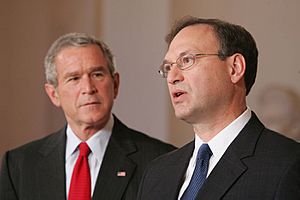
In 2005, Justice Sandra Day O'Connor announced her retirement from the Supreme Court. President George W. Bush first nominated John Roberts to fill her spot. But when Chief Justice William Rehnquist passed away, Bush nominated Roberts to be the Chief Justice instead. Then, Bush nominated Harriet Miers for O'Connor's seat. She later withdrew her nomination.
On October 31, 2005, President Bush announced he was nominating Justice Alito. The American Bar Association again rated him "well qualified."
His confirmation hearing took place from January 9 to 13, 2006. During the hearings, he answered about 700 questions. He said he would act as a fair judge. .....
Some senators asked him about his past connection to a group called Concerned Alumni of Princeton. Alito said he had listed this group on a job application to show his conservative views. But he said he disagreed with the group's views.
The American Civil Liberties Union (ACLU) opposed Alito's nomination. They said his record showed he might support government actions that limit individual freedoms.
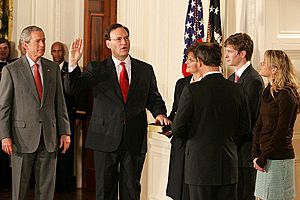
The Senate confirmed Alito to the Supreme Court on January 31, 2006. The vote was 58 to 42. He was sworn in later that day. He became the 110th justice on the Supreme Court. He was also the second Italian-American justice.
Time on the Court
Justice Alito delivered his first Supreme Court opinion on May 1, 2006. It was in the case of Holmes v. South Carolina. This case was about a criminal defendant's right to present evidence. He wrote for a unanimous court.
From the start, Justice Alito has generally had a conservative record. He often votes with the other conservative justices. However, he sometimes takes different positions. For example, in a 2008 case about worker protection (Gomez-Perez v. Potter), he sided with the more liberal justices.
In 2020, Justice Alito wrote a dissenting opinion in the case of Bostock v. Clayton County. He disagreed with the majority's interpretation of a law about discrimination.
In November 2020, Justice Alito spoke about the COVID-19 pandemic. He said that the restrictions during the pandemic were very severe. He called the pandemic a "Constitutional stress test."
Justice Alito is known as one of the Court's "most conservative justices." Since 2020, he has been seen as a key part of the Court's conservative majority. This majority has overturned some older legal decisions.
Free Speech Cases
Justice Alito has also written opinions in free speech cases. In Snyder v. Phelps, he was the only justice to disagree with the majority. This case was about the right to protest at a military funeral. He believed that the protesters' actions caused severe emotional distress.
In the 2007 case Morse v. Frederick, Justice Alito joined the majority. ..... However, he also warned that this ruling should not limit political speech.
Personal Life
In 1985, Justice Alito married Martha-Ann Bomgardner. She was a law librarian. They have two children. Martha-Ann stopped working to raise their children. The Alito family lived in West Caldwell, New Jersey, before he joined the Supreme Court. They now live in Fairfax County, Virginia.
Justice Alito is a military veteran. He is the only veteran on the Supreme Court since Justice Stephen Breyer retired in 2022. He is a big fan of baseball and the Philadelphia Phillies team.
Teaching
Justice Alito was a professor at Seton Hall University School of Law from 1999 to 2004. He taught courses on constitutional law and civil liberties. In 1995, he received an award from the school. In 2007, he gave the commencement speech there.
He also taught at Duke University School of Law as a visiting professor. He taught courses on constitutional interpretation.
Ethical Questions
Accusations of Accepting Gifts
In June 2023, a news report suggested that Justice Alito had accepted gifts. The report focused on a trip he took to a luxury fishing resort in Alaska. It suggested he might have received private jet travel from a billionaire businessman, Paul Singer. The report raised questions about whether he should have disclosed these benefits. It also questioned if he should have avoided cases involving Singer.
Before the report was published, Justice Alito wrote an article in The Wall Street Journal. He said the report's claims were incorrect. He argued that he was not required to disclose private air travel for social trips. This was because of an exception in the Court's rules for "personal hospitality."
These reports led some members of Congress to call for new ethics rules for the Supreme Court. Justice Alito later wrote that Congress does not have the power to regulate the Supreme Court. This statement led to more debate among lawmakers.
See also
 In Spanish: Samuel Alito para niños
In Spanish: Samuel Alito para niños
- Judicial restraint
- List of justices of the Supreme Court of the United States
- List of United States Supreme Court justices by time in office
- Unitary executive theory
- United States Supreme Court cases during the Roberts Court
 | Shirley Ann Jackson |
 | Garett Morgan |
 | J. Ernest Wilkins Jr. |
 | Elijah McCoy |


